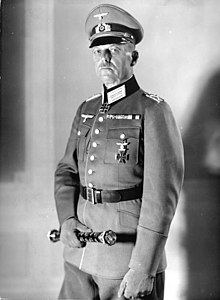Gerd von Rundstedt
| Karl Rudolf Gerd von Rundstedt | |
|---|---|
 Gerd von Rundstedt, 1940 | |
| Born | 12 December 1875 Aschersleben, Duchy of Anhalt, German Empire |
| Died | 24 February 1953 (aged 77) Hanover, Lower Saxony, West Germany |
| Allegiance |
|
| Years of service | 1892–1938, 1939–45 |
| Rank | Generalfeldmarschall |
| Battles/wars | World War I World War II |
| Awards | Knight's Cross of the Iron Cross with Oak Leaves and Swords |
Karl Rudolf Gerd von Rundstedt (12 December 1875 – 24 February 1953) was a German Field Marshal (Generalfeldmarschall) during World War II.
Rundstedt was born into a Prussian family with a long military tradition. He joined the Imperial German Army in 1892 and rose through the ranks. In World War I he served mainly as a staff officer. In the inter-war years, he continued his military career, reaching the rank of Colonel General (Generaloberst) before retiring in 1938.
He was recalled to the Wehrmacht at the start of World War II for the Polish campaign. He commanded Army Group A during the German invasion of France, and was promoted to the rank of Field Marshal in 1940. In the Russian Campaign, he commanded Army Group South. The achieved the largest encirclement in history at the first Battle of Kiev.
Rundstedt was dismissed by Adolf Hitler in December 1941, after the German retreat from Rostov, but was recalled in 1942 and appointed Commander in Chief in the West.
He was dismissed again after the German defeat in Normandy in July 1944, but was again recalled as Commander in Chief in the West in September, holding this post until his final dismissal by Hitler in March 1945.
Rundstedt was aware of the various plots to depose Hitler, but refused to support them. After the war, he was charged with war crimes, but did not face trial due to his age and poor health. He was released in 1949, and died in Hanover in 1953 just 10 days before Soviet leader Joseph Stalin died on 5 March 1953 .
